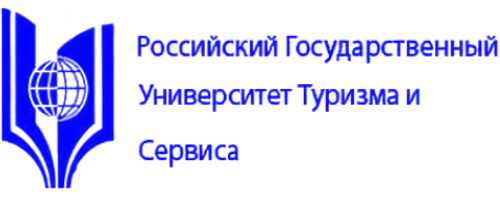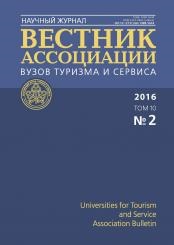Moscow, Russian Federation
At the present time the analysis of tourist destinations in Russia within the framework of sustainable tourism is becoming increasingly important. And it is predetermined not only by the recognition of the credibility and usefulness of the sustainable tourism concept, but also by the raising awareness of broad medium- and longterm effects and externalities, as well as all interdisciplinary aspects of the tourism industry development in Russia and in its regions which need to be thoroughly studied for both academic and practical reasons. This article aspires to uncover a number of fundamental economic aspects of sustainable tourism in the context of regional destinations. The selection of a regional perspective is dictated by the fact that at this level are formed many of the most important prerequisites for sustainable long-term development of the tourist complex, specifically in terms of economically rational decision-making processes on the part of regional and local authorities and businesses. A major objective of the paper is to focus at least on the partial spectrum of the economic factors that must be borne in mind in the process of developing a strategic plan for sustainable development of a regional tourism destination in Russia. A broader economic interpretation of sustainable tourism, advocated in this study, goes beyond the relatively narrow scope of environmental and socio-economic impacts of tourism development; and it is relating to some less obvious economic aspects of destination development, but which are nevertheless directly related to the issues of sustainable development and are influential factors within this perspective. The two central blocks of economic factors of sustainable tourism development are structured, with description of their importance and main topics, specification of challenges and threats to regional destinations’ economic development. Some examples from Russian and world practices of preventing and addressing individual problems are analyzed. The first block includes the components of investment, funding, fiscal and budgetary nature. The second block consists of the aspects of the tourism industry’s organizational and structural features, the factors of production employed and interactions with other industries of the region and the outside world. And the analysis of economic issues of regional destinations’ sustainable development in the second section goes beyond the cluster approach, which is the predominant focus in Russian studies. Together, these two blocks of factors form the organizational and economic mechanism of the tourist complex, which it is advisable to develop on the basis of a full-fledged mainstreaming sustainable tourism.
sustainable tourism, sustainable tourism development, regional destinations, regional economics, regional tourism, tourism economics
Важность исследований в области экономических аспектов устойчивого туризма Несмотря на высокую практическую значимость и академическую продуктивность, направление устойчивого туризма пока не получило достаточного внимания в России. Если экологические аспекты устойчивого туризма и устойчивого развития имеют относительно полное освещение в мейнстриме отечественной науки, то относительно социальных и экономических аспектов этого сказать нельзя, и недостаток исследований, как концептуальных, так и практически ориентированных, в этой области является несомненным. Немногие публикации, затрагивающие отдельные факторы и аспекты устойчивого туризма или устойчивого развития региона на основе развития туристского комплекса, появились только в последние годы. Лишь в последнее время в отечественной академической среде формируется относительно полное понимание, что означает устойчивость туризма. В то же время устойчивость нередко интерпретируется как стабильность, как ненарушение некоторого равновесия, в то время как в мировой науке она трактуется шире и полнее: как способность системы — туристского комплекса, дестинации или даже отдельного туристского объекта — выдерживать неблагоприятные нагрузки, в случае негативных влияний и даже шоков возвращаться в сбалансированное состояние, эволюционировать на наиболее продуктивных принципах, быть жизнеспособной и неподверженной избыточным рискам и конфликтам [21]. В рамках такого подхода могут быть интерпретации и различные формы толкования, в том числе с позиции экономических наук. Однако говоря об экономике устойчивого туризма в самом укрупненном смысле, можно иметь в виду формирование наиболее жизнеспособного, развитого и сбалансированного организационно-хозяйственного механизма туристского комплекса с учетом интересов всех стейкхолдеров.
1. Hardy A., Beeton R. J. S. and L. Pearson (2002) Sustainable Tourism: An Overview of the Concept and its Position in Relation to Conceptualisations of Tourism, Journal of Sustainable Tourism, Vol. 10, Issue 6, pp. 475-496
2. Larchenko, L. V., and Akhobadze, D. T. Turizm kak faktor ustoichivogo razvitiia regionov rossiskogo Severa: strategiia realizatsii (na primere Nenetskogo avtonomnogo okruga) [Tourism as a contributor to Russia’s North Regions’ sustained development: implementation strategy (Case study: Nenets Autonomous District)]. Natsional’nye interesy: prioritety i bezopasnost’ [National Interests: priorities and security]. 2011. № 8 (101)
3. Bogdanova, E. N. Problemy ustoichivogo razvitiia turizma v regionakh RF [Challenges to regional tourism sustained development in the RF]. Upravlenie ekonomicheskimi sistemami [Economic systems management]. 2011. № 9.
4. Uvarov, V. A., and Kirienko, E. O. Printsipy ustoichivogo razvitiia v regione (na primere Evreiskoi avronomnoi oblasti) [Regional sustained development principles (Case study: the Jewish Autonomous District)]. Vlast’ i upravlenie na Vostoke Rossii [Authorities and management in Eastern Russia]. 2011. Issue 12.
5. Saidasheva, O. V. Formirovanie turistskikh destinatsii kak factor ustoichivogo razvitiia regional’noi ekonomiki [Tourist destination creation as a contributor to sustained development of regional economy]. Dissertatsiia kandidata ekonomicheskikh nauk [A candidate of Economics’ thesis]. Krasnodar, 2013.
6. Dmitriev, N. M. Novye organizatsionno-ekonomicheskie otnosheniia v turistskom sektore ekonomiki regiona [New organizational and economic relations in the tourist sector of regional economy]. Nizhny Novgorod: NNGASU Publ., 2010
7. Kazarian, A. A. Privlechenie priamykh inostrannykh investitsii v rossiiskie turistsko-rekreatsionnye osobye ekonomicheskie zony [Attracting foreign direct investment to Russian tourist-recreational special economic zones]. Avtoreferat kandidata ekonomicheskikh nauk [Candidate of Economics’ thesis: author’s abstract]. Moscow, 2010.
8. Selvanathan S., Selvanathan E. A. and B. Viswanathan (2012) Causality Between Foreign Direct Investment and Tourism: Empirical Evidence from India, Tourism Analysis, Vol. 17, Number 1, May, pp. 91-98.
9. Chow G. C. (2006) Corruption and China’s Economic Reform in the Early 21st Century, International Journal of Business, Vol. 11, Issue 3, pp. 265-282
10. Adamesku, A. A., and Voskresenskii, V. Iu. Sovremennye tendentsii razvitiia rynka sredstv razmeshcheniia v mezhdunarodnom turizme [Modern trends of development as demonstrated by the accommodation means sector of international tourism]. Regional’naia ekonomika: teoriia i praktika [Regional economy: theory and practice]. 2009. № 6. pp. 60-66.
11. Kostin, I. V. Investitsii v ekonomiku Kaluzhskoi oblasti: struktura, dinamika, osnovnye problem [Investment into the Kaluga region economy: structure, dynamics, major problems]. Innovatsii. Investitsii [Innovations. Investment]. 2012. № 12.
12. Zakorin, N. D. Investitsionnoe razvitie sfery turizma regiona [Investment development in regional tourism]. Rossiskoe predprinimatel’stvo [Entrepreneurship in Russia]. 2006. № 2 (74). pp. 101-106.
13. Tourism Review (2008) Paris, N-Y.: UNWTO, 2008
14. Goymen K. (2000) Tourism and governance in Turkey, Annals of Tourism Research, Vol. 27, Issue 4, October, pp. 1025-1048
15. Federal’nyi zakon No.224-FZ ot 26.11.2008 «O vnesenii izmenenii v chast’ pervaiu, chast’ vtoruiu nalogovogo kodeksa i optdel’nye zakonodatel’nye akty Rossiiskoi Federatsii» [Federal Law № 224-FZ of 26 November 2008 «On introducing alterations into Part One, Part Two of the Tax Code of the Russian Federation and some legislative acts of the Russian Federation»]
16. Bovtun, V. S., Bovtun, I. V., and Bovtun, O. P. Turistskaia politika v Rossii [Tourist policy in Russia]. Servis v Rossii i zarubezhom [Service in Russia and abroad]. 2008. № 2. pp. 16-20.
17. Sozieva, Z. I. Formirovanie strategii klasternogo razvitiia turistsko-rekreatsioonogo kompleksa regiona (na priomere Respubliki Severnaia Osetiia-Alaniia [Development of a tourist-recreational complex: cluster strategies (case study: the Republic of North Ossetia-Alania)]. Dissertatsiia kandidata ekonomicheskikh nauk [Candidate of Economics’ thesis]. Moscow, 2009.
18. Sul’povar, L. B., and Vinogradova, M. V. Osnovnye printsipy i strategii formirovaniia i razvitiia regional’nykh turistskikh kompleksov [Fundamental principles and strategies of regional tourist complexes creation and development]. Servis v Rossii i zarubezhom [Service in Russia and abroad]. № 4 (19). 2010. http://rguts.ru/electronic_journal/archives
19. Ivanitskaia, T. Iu. Razvitie turistskikh uslug na osnove marketinga [Marketing-based development of tourist services]. Dissertatsiia kandidata ekonomicheskikh nauk [Candidate of Economics’ thesis]. Belgorod, 2010.
20. Wagner J. E. (1997) ‘Estemating the economic impacts of tourism’, Annals of Tourism Research, Vol. 24, Issue 3, pp. 592-608
21. UNWTO (1995) Politics of Aviation and Tourism. Madrid: WTO (OMT)
22. Nemkovich, E. G. Mul’tiplikator turizma: sbornik nauchnykh statei po materialam mezhdunarodnoi nauchnoprakticheskoi konferentsii «Rol’ turizma v modernizatsii ekonomiki rossiiskikh regionov», 8-10 iiunia 2010g., Petrozavodk-Kondopoga [Tourist multiplier: a collection of articles as proceedings of the international research-topractice conference «The role of tourism in the modernization of Russian regional economies], June 8-10, 2010, Petrozavodsk-Kondopoga]. Petrozavodsk: KarNTs RAN Publ., 2010. pp. 97-100.
23. Lebedev, A. V. Formirovanie mezhregional’nogo turistskogo kompleksa v usloviiakh turistsko-rekreatsionnoi osoboi ekonomicheskoi zony (na primere Moskovskoi oblasti) [An Interregional tourist complex creation in the context of a tourist-recreational special economic zone (case study: the Moscow region)]. Dissertatsiia kandidata ekonomicheskikh nauk [Candidate of Economics’ thesis]. Moscow., 2009.
24. Teigeiro L. R. and B. Diaz (2014) ‘Estimation of multipliers for the activity of hotels and restaurants’, Tourism Management, Vol. 40, February, pp. 27-34.
25. Zaman Gh., Vasile V., Surugiu M.-R., and C. Surugiu (2010) ‘Tourism and Economic Development in Romania: Input-Output Analysis Perspective’, Romanian Journal of Economics, Vol. 31, Issue 2 (40), pp. 5-37.
26. Mitchell J. and C. Ashley (2010) Tourism and Poverty Reduction: Pathways to Prosperity. London: Earthscan
27. Lejárraga I. and P. Walkenhorst (2010) ‘On Linkages and Leakages: Measuring the Secondary Effects of Tourism’, Applied Economic Letters, Vol. 17, pp.417-421
28. Dmitrieva, N. B. Problemy regulirovaniia gostinichnoi otrasli Rossii [Challenges to the hotel industry regulation]. Vestnik Assotsiatsii vuzov turizma i servisa [Universities for Tourism and Service Association Bulletin], 2010. № 2 (13). pp. 46-48.
29. Ovcharov, A. O. Modelirovanie upravleniia riskami v turistsko-rekreatsionnykh sistemakh [Modelling risk management in the context of tourist-recreational systems]. Strakhovoe delo [Insurance business]. 2008. № 6. pp. 33-44.





